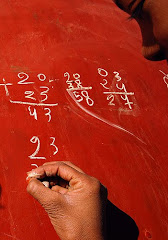Krista, congratulations on a job well done! Great discussion provoking questions, they made me even more sure that I want to explore how Professional Development could be used to improve instruction.
Experiencing School Mathematics has taken us through introductions and explorations into the two schools (Amber Hill and Phoenix Park) and into discussions in detail of the results of assessments for both. Now in Chapter 7, Boaler lets us hear the voices of the students as we 'Explore the Differences'. Through a mix of analysis of assessment results and interviews with the students involved we are able to see the differences in the capabilities of the students in these schools.
This chapter brings together all we have learned about the differences in curriculum and teaching styles of AH and PP. It is the proverbial 'the proof is in the pudding' scenario. Amber Hill students were able to use math knowledge, in class, when questions contained cues which indicated which 'maths' to use and when questions (GCSE) were of the short answer type. However, these same students were unable to determine for themselves which math concept/rule/procedure was needed to find a solution unless directions were explicit. When Boaler says that the 'math competencies displayed in different situations reflected both their understanding of mathematics and the belief that the students had developed about mathematics" she is discussing the student mathematical capabilities and it is clearly evident that AH students had very few.
On the bottom of page 106 I was struck by the student comments as they reveal their own realizations of how difficult they found the exam questions. It was their first inkling that there was a problem with their understanding of mathematics. Although naturally they blamed the test questions and labeled them unfair. "It's stupid really ' cause when you're in the lesson,.... you get the odd one wrong... you think well when I go into the exam I'm gonna get most of the right,'cause you get all your chapters right, But you don't. ( Alan) To me as an observer Alan's comments are a poignant reminder of the insecurity and stress that students who have little understanding feel as they are being pushed through one grade/curriculum after another. My heart really did sink as I clearly remembered being in an exam and realizing I just didn't know how to proceed, it was not good for the self esteem.
Chapter 7 gives example after example of how damaging the traditional style of teaching is for students who participate in it. They are unable to make connections between math concepts and unable to connect math to the real world. All in all, I couldn't help feeling a little sad at what educators have done to generations of students. How can we stop this from continuing? Krista asked where do we start, I think we have to start with teachers own mathematical understanding, beliefs, knowledge and attitudes. I know this for sure, we can't continue to ignore what is evident and cling to our old way of making sense of mathematics, because it just promotes a false belief that understanding has been reached when in fact nothing could be farther from the truth.
Video Links Have Been Moved!
Sunday, November 1, 2009
Subscribe to:
Comments (Atom)

